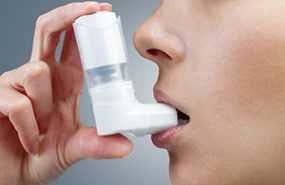Work-related Asthma
What are the symptoms of work-related asthma?
How do I know if I have work-related asthma ?

Symptoms for work-related asthma tend to get better on weekends, vacations, or other times when away from work. However, in some cases, symptoms do not improve until an extended time away from the exposure or trigger.
Work-related asthma can be diagnosed by your doctor. Tell your doctor about work exposures and possible asthma triggers, including your job, tasks, and the materials you use. Also consider logging when and where your symptoms occur to help determine any patterns. Your doctor will ask you questions about your symptoms and will conduct a physical examination. The doctor might also order one or more of the following tests:
- Breathing tests (e.g., peak flow readings and spirometry)
- Allergy tests such as skin or blood tests
If your doctor is concerned about something other than asthma, he/she might order other tests such as x-rays or imaging tests.
Symptoms

The symptoms of work-related asthma are the same as symptoms for non-work-related asthma. They include:
- Wheezing
- Coughing
- Chest tightness
- Shortness of breath
Asthma symptoms can come and go, and some workers might not have all symptoms. Workers can get work-related asthma even when using personal protective equipment such as respirators or face masks. Sometimes, these breathing problems start at work and continue even after the worker leaves work and exposure has stopped.
How is work-related asthma treated?

The most important step of treating asthma is stopping or reducing exposure to the asthma triggers causing symptoms. You should work with your doctor to develop a personal asthma control plan. Asthma is often treated with two general types of medicine:
Quick-relief rescue inhalers (e.g., albuterol, levalbuterol) to open the airways. People use these medicines to treat asthma attacks or flare-ups.
Long-term control medicines to reduce inflammation in the airways. People use these medicines to help keep asthma symptoms from occurring. When these medicines are working well, quick relief medicine is not used as much.
- Page last reviewed: May 16, 2017
- Page last updated: July 11, 2017
- Content source:
National Institute for Occupational Safety and Health Respiratory Health Division


 ShareCompartir
ShareCompartir